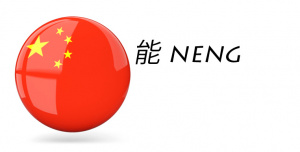Difference between revisions of "Language/Mandarin-chinese/Vocabulary/能-néng"
< Language | Mandarin-chinese | Vocabulary
Jump to navigation
Jump to search
| Line 38: | Line 38: | ||
|keywords=verb, example, rule, phrase, teach, lesson, course, grammar, vocabulary | |keywords=verb, example, rule, phrase, teach, lesson, course, grammar, vocabulary | ||
|description=能 indicates the ability to do something. Here are some examples in this lesson. | |description=能 indicates the ability to do something. Here are some examples in this lesson. | ||
|og:image=https://polyglotclub.com/wiki/images/ | |og:image=https://polyglotclub.com/wiki/images/7/78/%E8%83%BD-neng.jpg | ||
}} | }} | ||
Revision as of 18:26, 16 November 2018
How to use 能 neng
Hello everybody!
In today's lesson, we will teach you how to use the Chinese verb 能 neng.
Feel free to edit this wiki page, if you think it can be improved.
能 neng indicates the ability to do something:
- 我能打电话 wǒ néng dǎ diàn huà
I can call.
(I can do it)
There is a nuance with 会 huì "know how to do something", even if the use is sometimes very close:
- 能说话. néng shuō huà
I can speak.
(I have the physical capacity: mouth, tongue, etc.)
- 会说话. huì shuō huà
I can speak.
(because I have learned it, it is a know-how and in this sense the sentence is also understood by the eloquence: "I know how to speak well.")
能 neng also indicates permission:
- 我能不能 去看 他? wǒ néng bù néng qù kān tā?
Can I go see him?
- 不能 bù néng
No.
Sources
http://www.chine-culture.com/chinois/cours-de-chinois-6-grammaire.php
